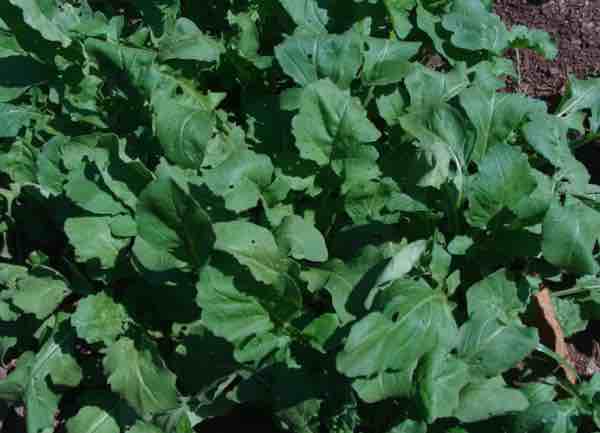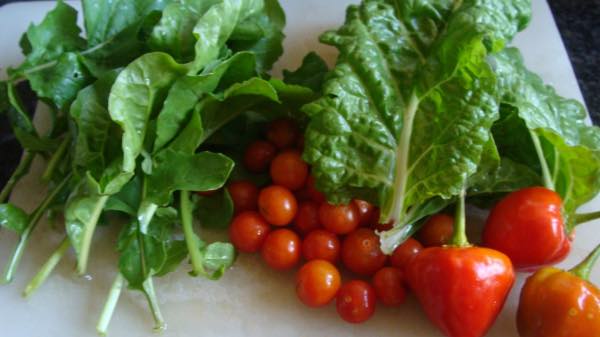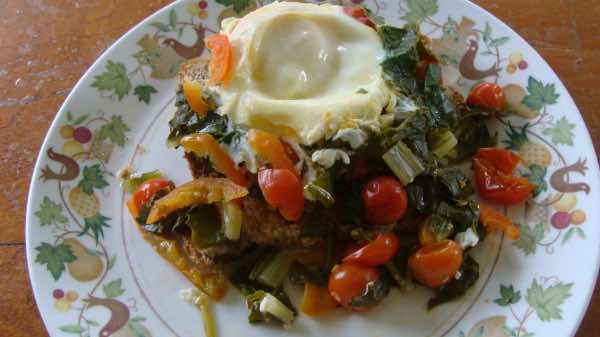- Bernard Preston homepage
- Greens
- Nutrition of Arugula
Nutrition of arugula
The nutrition of arugula includes all that of the dark-green leafy vegetables.
It grows year-round in a mild climate, and does well in colder weather like most of the cabbage family. It is not particularly sensitive to frost.
All these dark-green leafy vegetables have differences in their nutritional
content; one has more folate, and another like kale is particularly rich in lutein for
your eyes. Each has its own unique merits and it behooves us to enjoy as many
of them as we can lay our hands on.

This page was last updated by Bernard Preston on 9th April, 2023.
Arugula is specially known, along with Brussels sprouts, for its sulforaphane, a potent detoxifying-agent of those substances that cause malignancies to which we are all exposed on a daily basis.
There are two things that I particularly like about arugula.
- It
adds an unusual flavour to what may otherwise be a rather dull-salad; let it
be said, an acquired taste. Not everyone is fond of it.
- It provides an alternative when other dark greens like spinach may be ailing in midsummer; it's not subject to mould.
When it is young, arugula adds a richness to a salad. A little older and you can mix it with any other greens like cabbage, spinach or kale that you are cooking for a little variety.
Plus the arugula plant is so easy to grow. Simply turn a small area in the garden with a fork, say three square-feet, until the earth is finely crumbled. Water it, and then sprinkle the seed thinly over the soil; or in rows if you choose.
Crumble some fine-earth over the seeds until they are no longer visible, and water again. Within a week they will have germinated and you'll be enjoying the young leaves in a month or so; it is perfect for the summer vegetable garden too provided it gets enough rain.
If you want baby arugula for your salad, then plant a small area, even just a square-foot, every month.
Growing arugula is really a cinch; water the young plants regularly in hot-weather. Pluck a few leaves every day for your salad.
Rocket
Arugula is known in much of the world as rocket. It has all the benefits of the dark-green leafy vegetables, plus some.
It ranks in the top 20 vegetables providing the phytochemicals that fight inflammation and tumours; numerous vitamins, especially folate and K too. It is rich in minerals like calcium.
In particular the combination of vitamin K and calcium means it has the specific attention of the older person; strong bones are essential for a long life, free from the disability and pain of osteoporotic fractures.
Arugula also contains a surprisingly large amount of vegetable protein; finding alternative sources to red-meat is essential if we want a long life, free of tumours.
Whilst I am not a vegetarian, we certainly are always on the lookout for tasty greens and legumes that provide us with an alternative source of protein. The nutrition of arugula should not be underestimated.
By the way the broad bean is the richest source of vegetable protein; twenty-five percent. It too is easy to plant, but has a much longer growing season.
Read more about how to plant broad-beans.
It is the phytochemical sulforaphane that gives arugula the ability to prevent tumours; at least, that's where the research is progressing.
Pharmaceutical-companies are working hard at producing a drug based on this sulforaphane that will give us that protection. For our part, we believe that we should let our food be our medicine; get it from the nutrition of arugula, at a tiny fraction of the price.
At the DC's coalface, patients with progressive weakness of the quadriceps from diabetes remain a huge challenge. They are unable to rise easily from a chair and falls due to weakness of the muscles around the knee are commonplace. All dark-green leafy vegetables, including arugula have an antioxidant called alpha lipoic-acid that lowers blood glucose.
Raised blood glucose causes damage to the nerves supplying particularly the quadriceps muscle. It is an especially distressing neuropathy, also resulting in the lurgy that all men and most wives dread; impotence.
Inability to walk any distance, regular falls and impotence are all good reasons to enjoy the nutrition of arugula, and the other dark-green leafy vegetables on a regular basis; before the disability arrives.
Grow your own rocket; it is so easy.
Sulforaphane
Sulforaphane is a phytochemical found in dark-green leafy vegetables; it is an especially important part of the nutrition of arugula, but also is found in large amounts in broccoli and Brussels sprouts.
It's complex biochemistry, far beyond the scope of this page, but sulforaphane is derived from a compound called glucoraphanin that is found in dark-green leafy vegetables. Strong research involving more than 50 studies has conclusively shown that it is the active ingredient that is able to detoxify tumour-causing agents that we are all exposed to on a daily basis.
That could be diesel-fumes in the air we breathe, asbestos fibres and plastic microparticles in the water we drink; and pesticides on the foods we eat, for example. We simply cannot escape them.
Reckoned with the dubious colourants, preservatives and flavour-enhancers added to our processed food, and it's clear that we all should be consuming these detoxifying vegetables on a daily basis; after the tumour in the breast or prostate has been found, it may be too late. Prevention is the key.
Sulforaphane for diabetics is another of the benefits of the nutrition of arugula.
Eggs Florentine with arugula

Traditionally eggs in Florence are poached on a bed of spinach; I find it a little dull, though let it be acknowledged that it's extremely nutritious, especially if you can find free-range hens.
Instead we introduce a little fried-onion, garlic and peppers to the greens; it's a breakfast to die for, with all the benefits and more compared to the traditional recipe.
You can include whatever dark-green leafy vegetables like arugula that you enjoy. I often add kale or beet-tops too for their protection of the eyes and generalised inflammation in the body; lutein and betaine are the active phytonutrients.
Mixing the greens brings you their individual benefits; add the nutrition of arugula to that of spinach, chilies and tomatoes. The flavour is simply terrific, and it is such a pleasure to be able to enjoy a meal without having to worry about calories and cholesterol; tuck in, you are in for a treat.
In fact if you really want to strike that dirty four-letter word "diet" from your vocabulary, then just get into foods like this on a daily basis. Those pounds will slowly come off; permanently.
Diets don't work anyway. After one year, 95% of folk are back to their original weight, or heavier; that is researched, no matter which you follow. They are a complete waste of your time, energy and money; and will leave you sorely depressed.
If you don't believe me read more about it at weight loss research.
These ketogenic diets have some merit but they too aren't sustainable. Can you give up bread for ever? But if you bake your own using wholegrain flour then there is no need to avoid it. And thankfully new potatoes[2] do not play havoc with our blood-glucose.

We usually enjoy it on a slice of toast made from our own low GI bread; so easy to bake and demanding only five-minutes of your time each day.
Arugula has many of the nutritional benefits of spinach; and kale too.
These musings from the summer vegetable garden will explain how we produce more than a ton literally of organic food every year right in the suburbs.
Authentic hummus recipe
An authentic hummus recipe contains just chickpeas and tahini, a sesame seed paste which is not unlike peanut-butter, only nicer; and half a lemon or lime.
To that you can add whatever you like. A green like parsley is often used, and I've been experimenting with arugula instead; it makes for a lovely change.
Researchers have found that adding seven or more coloured foods to your plate every day will result in at least a 30% lower all-cause of death. We play with the many delicious herbs, spices and greens like rocket in our cooking; that is why we can in our eighth decade enjoy a life without any chronic medication whatsoever[3].
"It has been estimated that 20% of Medicare beneficiaries have five or more chronic conditions; and fifty percent are taking 5 plus drugs daily."
You will enjoy better eyesight, less cardiovascular conditions or malignant disease; best of all, it just tastes so good. Try planting some seed this week and get all the benefits from the nutrition of arugula; it grows like a weed giving you fresh greens for months. I am not exaggerating.
You will have to keep the chickens out if you have any; they make a beeline for the rocket and kale.
- Everything you need to know about arugula at Medical news today.
- New potatoes.
- Life without medication. Web: https://tinyurl.com/3r22399e
When browsing use right click and Open Link in New Tab, or you may get a bad gateway signal.
Newsletter
Our newsletter is entitled "create a cyan zone" at your home, preserving both yourself and Mother Earth for future generations; and your family too, of course. We promise not to spam you with daily emails promoting various products. You may get an occasional nudge to buy one of my books.
Here are the back issues.
- Investing in long-term health
- Diseases from plastic exposure
- Intensive lifestyle management for obesity has limited value
- A world largely devoid of Parkinson's Disease
- The impact of friendly bacteria in the tum on the prevention of cancer
- There's a hole in the bucket
- Everyone is talking about weight loss drugs
- Pull the sweet tooth
- If you suffer from heartburn plant a susu
- Refined maize meal and stunting
- Should agriculture and industry get priority for water and electricity?
- Nature is calling
- Mill your own flour
- Bake your own sourdough bread
- Microplastics from our water
- Alternative types of water storage
- Wear your clothes out
- Comfort foods
- Create a bee-friendly environment
- Go to bed slightly hungry
- Keep bees
- Blue zone folk are religious
- Reduce plastic waste
- Family is important
- What can go in compost?
- Grow broad beans for longevity
- Harvest and store sunshine
- Blue zone exercise
- Harvest and store your rainwater
- Create a cyan zone at your home
Did you find this page interesting? How about forwarding it to a friend, or book and food junkie? Better still, a social mead tick would help.
- Bernard Preston homepage
- Greens
- Nutrition of Arugula
Address:
56 Groenekloof Rd,
Hilton, KZN
South Africa
Website:
https://www.bernard-preston.com